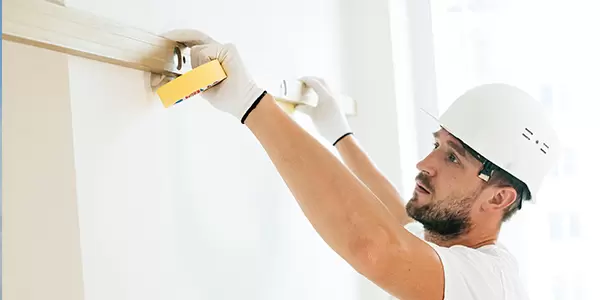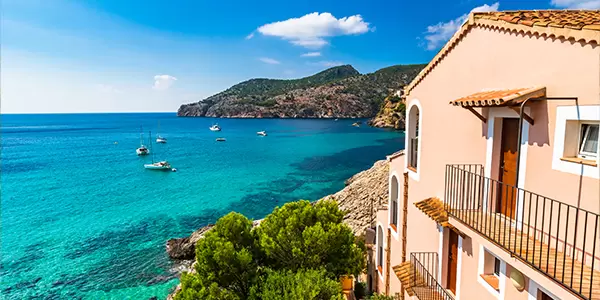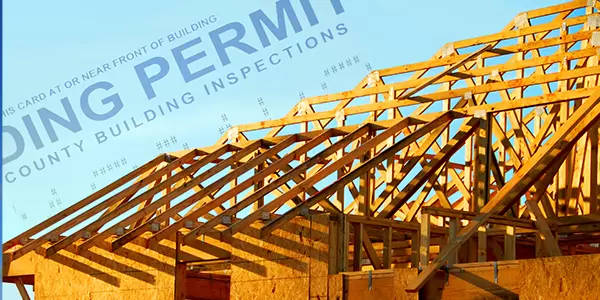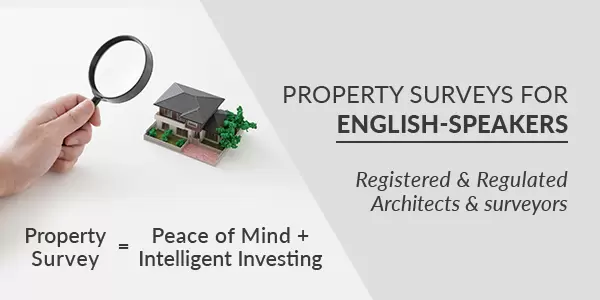
Are you an English-speaker thinking of buying property in Spain in 2024?
If so, you're not alone. In 2023 alone, more than 87,000 properties were purchased in Spain by foreign buyers. This represented 15% of the total number of conveyances that took place, up from 13.7% the previous year.
If you've begun to do some research, it is natural to feel overwhelmed, with so many factors to take into account. So many, in fact, that it is difficult to cover them all in one single article!
However, you will find below an overview of all of the major issues that you need to know, deal with - and be careful of - in order to ensure that you're property investment in Spain is successful.
In this article we will begin with one of the most popular questions lawyers in Spain are currently asked:
1. Are British expats still buying property in Spain?
Since many of our clients are originally from the UK, it makes sense that a very common topic that comes up in our conversations is whether British citizens are able to buy property in Spain after the cut-off date following the Brexit referendum in the UK. Of course, this really touches on a wider discussion as to their ability to get residency in Spain, and if so, under what conditions and following which process etc.
First things first: while British nationals continue moving to Spain from the UK, it must be noted that as they are now considered non-EU nationals, residency rights here have changed.
In a separate article, we provide in-depth information on the impact of Brexit on British citizens who have either already bought a property in Spain or are planning to do so in the future.
British nationals are still buying property abroad, despite the referendum result, with many still making the decision to spend their retirement in Spain. Moving abroad is still a viable option, but each person's situtation will differ, so better to take a look at our article dedicated to this theme if you are unsure about your residency rights in Spain.

2. Will British citizens have any problems visiting their properties in Spain?
Regardless of residency rights, British nationals are, of course, still able to visit their property in Spain and stay for up to 90 days in any 180-day period, even after Brexit.
For may however, this may not be sufficient. So, before you begin checking the listings of houses for sale in Spain, note that Brits buying property in Spain don't automatically get residency in Spain just because they are property owners there. With a standard tourist visa, included in a British passport, you can stay for up to three months without having to get any official document or special permission from the Spanish authorities.
That said, unless you have been living in Spain before the cut-off date, and fulfil the criteria for proving this, then if you are a British citizen you will need to obtain a residency visa in order to stay more than 90 days at a time. There are a number of options for Spanish visas for those considering a move to Spain:
- Golden Visa Spain: Buying a Property worth over €500,000 (may be time-limited according to the Spanish government's most recent announcements of an intention to end this route to residency).
- Non-lucrative visa Spain (visa that entitles the bearer to reside but not work in Spain)
- Have access to another EU Passport e.g. Irish passport due to a grandparent's ancestry or marriage to an EU citizen (Family Reunification Visa)
- Starting business in Spain
- Digital Nomad Visa
For those living in Spain after Brexit, and who are able to gain residency in Spain via one of the visa options above, your first decision may well be whether you want to purchase or rent a property in Spain.
3. Should you buy or rent property in Spain?
Before taking the plunge and buying a property, you might consider whether renting might better suit your needs and plans.
By renting you can get to know a local area much better before you buy, and so you can analyse and understand the local real estate market better, before you make a big investment.
For those moving to Spain from the UK, it is worth noting that renting in Spain offers tenants enhanced rights, in comparison to tenants in the UK. As a result, landlords in Spain are more likely to seek enhanced deposits and guarantees before agreeing to lease a property.
Together with increased rights are increased obligations, requiring tenants in Spain to contribute more towards repairs than would be the case in the UK. However, this is currently being studied by the Spanish government, and new rules are likely to be set-out in new legislation, due in 2023.
Of course, many do see renting as wasted money, and many decide to buy property in a Spanish area that they are already familiar with. So, if you are confident that you know the area well enough - the parts to avoid, the parts that you are aware tend to command above average prices, then buying may be a better option for you.
Once you know whether renting or buying is the best option, next you will want to consider where you want to live in Spain.
Want to hear what other clients
are saying about us?
4. Where to buy? The different regions of Spain
Spain offers buying opportunities for both British and other foreign citizens. Depending on the buyer's preferences, each region may offer different advantages in terms of climate, geography, property types and prices.
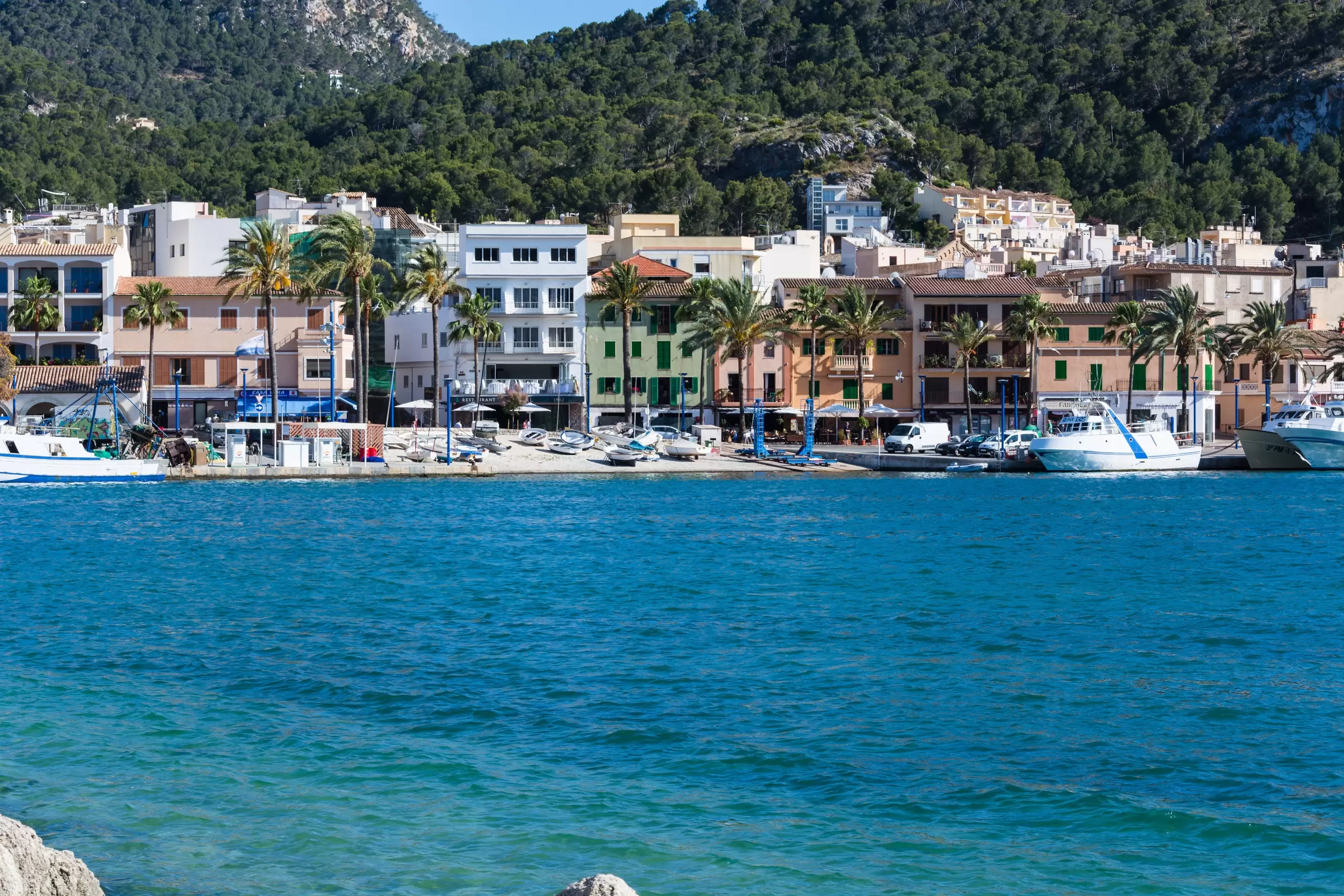
The Mediterranean Coast - including the ever popular Costa Blanca and Costa del Sol - is a particularly popular destination for expats buying property in Spain, with its warmer climates, accessible beaches and plethora of villas.
Spanish property prices can be higher along the coast than in other parts of Spain due to its popularity, but property buyers can still expect relatively low prices compared to buying in northern Europe. In addition to villas, apartments are also common here providing an attractive option for buying investment properties.
The Balearic Islands are another popular buying destination offering beautiful coastline views, mild temperatures and plenty of sunshine throughout the year.
There is a wide range of properties for sale in Majorca (Mallorca) and the other islands including villas, townhouses and luxurious apartments. Prices tend to be higher here due to the demand from foreign property buyers, but buying on the islands can still provide a good buying opportunity with attractive rental income yields. For more in depth information, see: buying property in Mallorca and buying property in Ibiza.
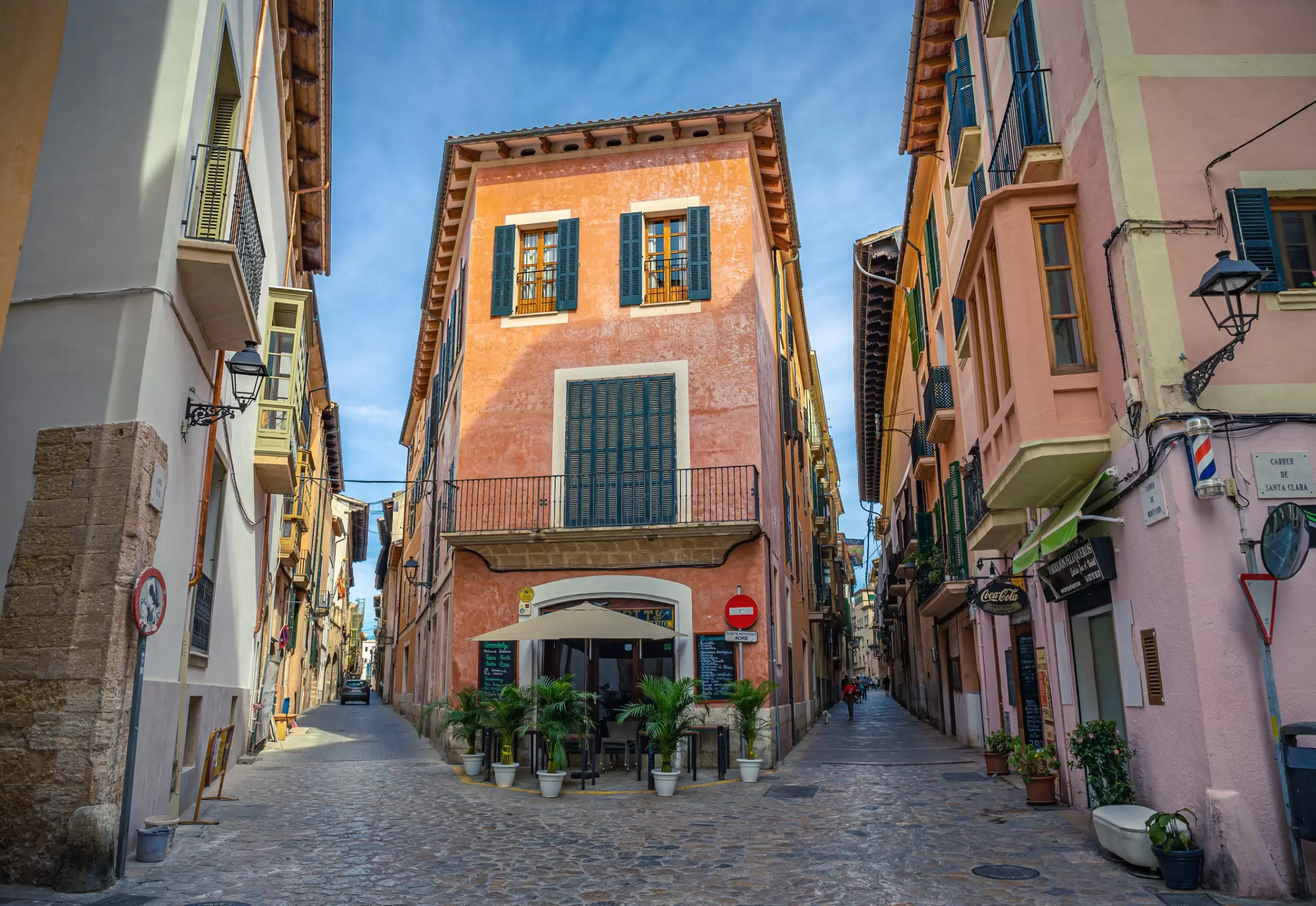
The Canary Islands are an increasingly popular buying destination for British citizens due to their diverse and unique geology, warm climate and range of properties available.
Property prices here tend to be lower than many places in mainland Spain, offering buying opportunities for budget conscious buyers. The islands also offer attractive views of volcanoes, rainforest and desert - making them a top choice for those looking for something different.
Buyers who prefer more traditional Spanish culture might opt to buy property in regions such as Andalusia or Extremadura, where buying costs may be lower and the property types more traditional. These regions also offer diverse landscapes including rolling hills, olive groves and vineyards - offering a getaway from bustling tourist areas.
Overall, buying property in Spain presents a range of buying opportunities for British and other foreign citizens. Each region offers different advantages depending on the buyer's specific needs, preferences or budget.
From luxuriously modern apartments in the Mediterranean Coast (see our guide to buying property in Barcelona) to more traditional properties in Andalusia or Extremadura, buying in Spain can provide attractive investment prospects for those willing to take advantage of what this unique country has to offer. More information is available in our article on the best places to buy in Spain.
Once you have decided where in Spain you would most like to spend your time, the next consideration is one of the most important, and relates to the financial side of the process.
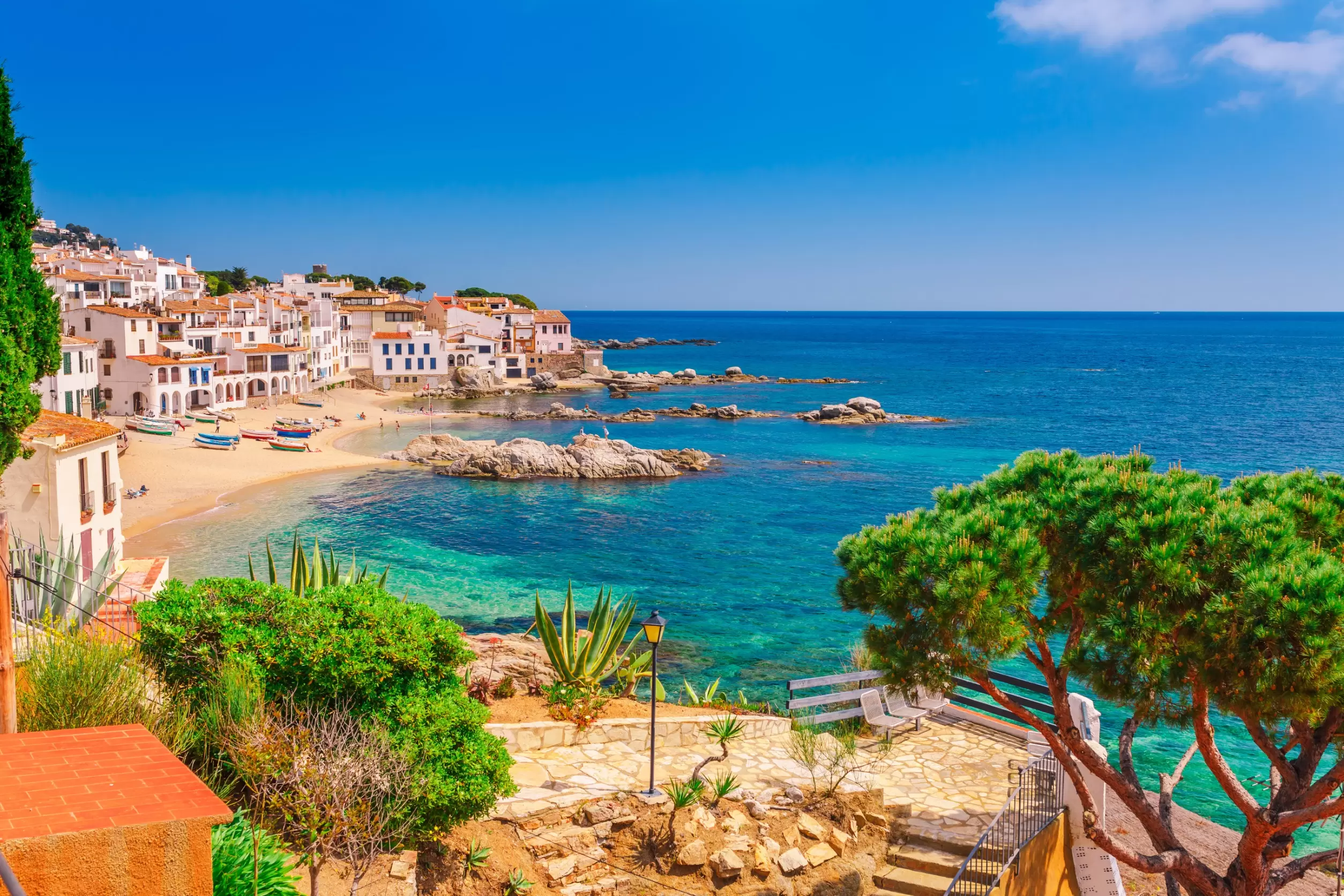
5. The Spanish property market and house prices in Spain
The Spanish property market is very much a collection of different markets, and local factors trump national figures. However, trends can be seen through analysis of the periodic reports released by industry bodies.
With interest rates rising around the world during 2023, and an expected credit squeeze around the corner, the financial conditions for buying property are becoming more difficult.
The graph below, from figures produced by the Association of Spanish Notaries, showing the variation in Spanish property prices, compared to 12 months prior. suggests that the increase in interest rates is beginning to have an effect on the rate of increase in property prices.

That said, according to the Bank of Spain, the average interest rates on mortgages of over 3 year terms have eased slightly in early 2024, from just over - to just below - 4%.
Overview of Market Dynamics
Recent statistics, published by the Land Registries Association of Spain from the fourth quarter of 2023, show a nuanced scenario in the Spanish property market, particularly concerning purchases by foreigners. One trend worth noting is the decrease in property transactions, both overall and within the segment involving foreign buyers. This period recorded a -7.3% change over the previous quarter in the total number of property transactions, and a -13.5% decrease compared to the same period in 2022.
Prices and Regional Variations
Despite the slowdown in sales, the price of property has continued to rise, albeit at a moderated pace. The average price per square meter has increased slightly by 0.5% over the quarter, maintaining a growth trend albeit slower than previous quarters. Notably, the regions with the highest average prices include the Balearic Islands, Madrid, and the Basque Country, while the lowest prices were found in Extremadura and other inland areas.
Regional variations are evident, with significant price differences across communities and provinces. For instance, coastal and island areas like the Balearic Islands and Málaga have seen higher transaction volumes and prices, attributed to their attractiveness to foreign investors and residents.
Foreign Buyer Activity
The proportion of property purchases by foreigners has slightly decreased to 15.12% of total transactions, marking a subtle quarterly decline of 0.32 percentage points. However, this segment remains robust, indicating sustained interest from international buyers in the Spanish property market. British, German, and French nationals lead in property acquisitions, signifying continued preference from European buyers.
Trends in Property Types
The data reflects a diversification in the types of properties being purchased. There has been a slight shift towards more purchases of new properties versus used ones. This trend might be indicative of a growing buyer preference for modern amenities or potentially better investment returns from newer properties.
Future Outlook
The property market is showing signs of entering a cooling phase, with reduced transaction volumes possibly leading to price stabilizations or minor adjustments. The slowing pace of price increases, along with decreasing transaction numbers, could indicate a market adjustment where prices might stabilize or grow at more sustainable rates.
Overall, while the market has experienced some cooling, particularly in transaction volumes, prices have continued to grow modestly. The sustained interest from foreign buyers, despite a slight decrease, suggests that Spain remains a desirable destination for real estate investment. The market's future will likely be influenced by broader economic conditions, interest rates, and the global economic climate, which could impact foreign investment flows into the country.
6. So, is buying a house as an investment in Spain a Good idea?
Property prices in Spain, just as in other countries, will vary largely according to location as well as age and style of property, sea or mountain views (if any!) etc.
It is difficult to compare an inner-city apartment in a rural town in the Spanish interior, with a beach property with views over the Mediterranean in, say, Marbella.
In terms of what you should expect to pay for a particular type of property in Spain, the best thing to do is research current market values in your chosen area. Prices can change quickly, so make sure you get up-to-date information before making an offer on any property.
You will also want to take into consideration your motivations for buying a property - you could be investing with a view to renting-out the property either long-term or holiday rentals, or you might be planning a permanent move to Spain.
If buying a property in Spain to rent-out - especially to tourists - great care must be taken to ensure that the property has a Touristic licence, or at least the possibility of obtaining one, as anyone who wants to sell property in Barcelona will know, the moratorium on new tourist rental licences can have an impact on the asking price. You may also wish to consider a buy to let mortgage in Spain. You will also want to overseas landlord tax.
The graph below from Spanish National Institute of Statistics (INE) shows the evolution of the average price (in thousands of Euros, vertical axis) for Spanish property for sale in Spain from 2007 through to the 3rd quarter of 2022:
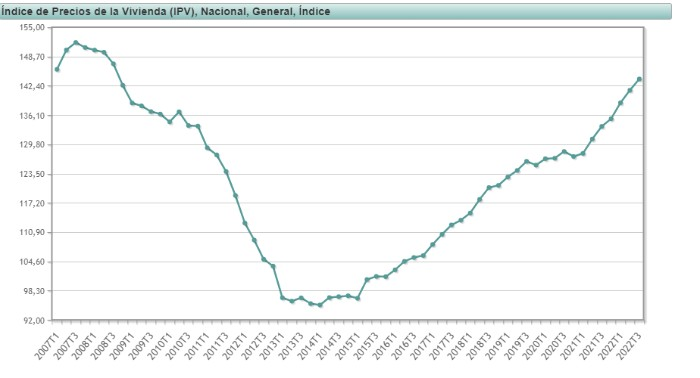
While it can be seen that property values have largely - though not quite - recovered to the levels seen before the financial crisis of 2007/8, the graph masks a lot of divergence between different regions of Spain and even greater variations depending on location near to a beach, city centre, park, sea views, style and age of property etc.
Accordingly, it’s important to have a clear idea of what type of property and what price range you’re looking for before starting your search.
Latest figures suggest that the rate of price increases are beginning to slow, at least in most Autonomous Communities. In the image below, the Orange bar shows the rate of increase (%) in Q2 of 2022 compared to the same quarter of 2021, while the red bar shows the year-on-year increase for Q3.
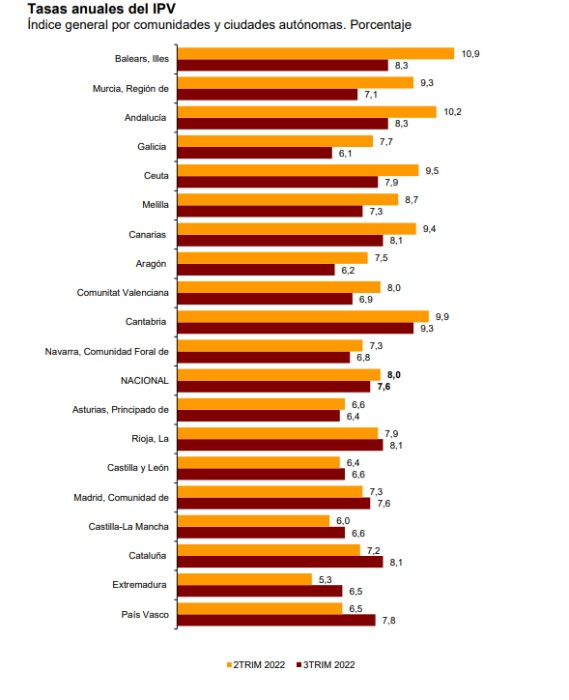
Ultimately though, when it comes to timing, with interest rates rising, if you need a mortgage, you may wish to act with greater speed, to secure a sufficient loan to cover your requirements. On the other hand, if you are a cash buyer, you may want to see how the market evolves in the coming months.
That all said, as the figures seem to show, Spain continues to attract property investors from around the world.
7. And, what about buying an 'off-plan' property?
Buying a Spanish property off-plan was all the rage in the heady days of 2000-2008. The attraction of this form of property investment was a mixture of being able to invest a relatively small amount of money as a down-payment, then flip the same property 1-2 years later at a healthy profit. Of course, the property crash of 2007-2008 ended this abruptly.
However, there do remain some clear benefits to buying off-plan:
- You get to buy a brand new property, with all modern features
- You can make payments towards the property in instalments which may be more convenient
- It may be the only way to buy a property in a sought-after area of Spain
That said, there are negatives, in particular that you are effectively paying money to someone who is promising to deliver the property, rather than paying for the property itself.
It is important to make sure that the builder has the appropriate planning permission to build the property. While this is also required with the purchase of existing properties, it is somewhat easier to discern in the latter case.
Another concern is what happens if the property never gets built? While this possibility may seem unlikely, it has come before the courts frequently due to the effects caused by the global financial crisis and the pandemic. One would assume that any monies paid over could be claimed back from the builder, but of course if the builder has gone into bankruptcy, what happens then?
Fortunately, for many who may have found themselves in this situation, Spanish legislation came to rescue in the form of law 57/1968 (which has been modified by the law 38/1999) allowing recourse against the bank in which the funds were deposited.
Effectively, the law imposes to the bank the obligation of requiring to the promotor the opening of a special bank account with a guarantee of refunding in case the promotion is not finished, but the main characteristic of that law is that the bank is not consider as a guarantor but as joint responsible with the developer as per Law 57/1968.
8. Costs of buying property in Spain
The headline price of a a property in Spain does not give the full picture, unfortunately. The full costs of buying property in Spain will vary according to what you are buying, where you are buying and how you are buying. It is fairs to say that the cost of buying property in Spain is rather higher than in countries like the UK - in fact, you may find a calculator handy!
Buyers often ask about the average cost of buying a house in Spain, but really there is no such thing. The reason is that the average fees for buying a house are mostly composed of taxes which depend on the value of the property, primarily.
Below, we will consider the principal costs buying property in Spain, many of which will depend on the purchase price - especially property tax. Property taxes in Spain add a considerable amount to the overall property buying costs, and the tax authorities in Spain enthusiastically ensure that the property price declared is not below market value to reduce how much tax is paid to the Spanish tax office. So, you should be extra-careful if a vendor suggests declaring a lower purchase price than the real purchase price paid.
It is convenient and logical to consider the property buying costs in Spain in line with the buying process, since when buying a property in Spain, each step generally increases the cost of buying. Also, if this is the first time that you are buying a property in Spain, this will introduce you to the process to follow when making a property purchase here.
Below is a list of the main areas of costs incurred when buying property in Spain:
The Property Valuation Fee
The surveyors fees for buying a house in Spain is, to an extent controlled by law and varies according to the price of the property. The minimum amount chargeable for the carrying out of a valuation is €208 and will ultimately depend upon the following factors:
- Not all surveyors or survey companies charge the same
- The location of the property
- Will the surveyor need to charge expenses (mileage etc) to reach the property?
- Does the surveyor need to access technical information (plans etc)?
Ultimately, the financial institution will have to accept the surveyors report and so you will most likely use one recommended by them or by an independent surveyor like TINSA that is well known and has links with most of the financial institutions.
The Association of Professional Property Surveyors recommend a price of between €250 and €300 for a property valued at €120,000, and it increases according to the value of the property.
Deeds of Purchase - Notary Fees
While it is perfectly legal to arrange for the transfer of a property in Spain via a private legal contract, this is not the typical way of doing so. From a practical point of view, no financial institution will offer a mortgage to facilitate the purchase without a public deed.
There is also always a risk of fraudulent behaviour if the public deed does not reflect your ownership of the property.
The process involves the drawing-up of the deeds of transfer by a public notary. A notary is an independent official who oversees the process and ensures that the proceedings take place according to the law and that the documentation is verified. Below is a table with approximate notary fees according to purchase price. Please note, your notary's fees may vary, and the cost must always be confirmed by the notary before proceeding:
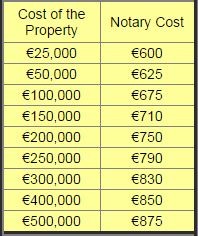
Inscription on the Land Registry
Once the property has been transferred, it is advisable to register the new ownership details with the public property register. Apart from not being able to obtain a mortgage without doing so, failure to register can cause multiple problems in the future with regard to future property transfers, inheritances, defending title against third parties etc.
If you are buying land in Spain as opposed to simply a house or apartment, there are additional matters you will need to take care of.
Below are approximate costs for having this carried out. It will be necessary to check specific prices with the individual land registry.
Legal Fees
The fees for providing the legal assistance required for purchase or sale of a property in Spain, while they may vary from lawyer to lawyer, will typically average around 1% of the value of the property. This may vary if the value of the property is particularly high or low, but for most 'average' conveyances, the costs will be approximately 1%.
Also, the legal fees charged may rise if the lawyer is required to carry-out more work if a mortgage is used to purchase the property.
Bottom line, as in any other professional field, you will need to check with the individual lawyer and perhaps pay a dividend for any lawyer with a particularly good reputation.
Want to hear what other clients
are saying about us?
Mortgage Fees
If you are purchasing property in Spain with financing, you will of course face a number of costs involved in arranging a mortgage in Spain and include commissions charged by the financial institution involved as well as administrative fees to the government. The mortgage costs can be divided into two types: Finance Check and Opening Charge.
Finance Check: The mortgage costs associated with checking into the applicant’s financial history to determine if they should qualify to receive the loan is a percentage over the total amount of the mortgage conceded. This is a one-off payment and may only be charged where the mortgage is issued.
Opening Charge: Likewise there are costs involved in the arrangement of the mortgage. The administration expenses for a mortgage with a value below €150,000 usually include the charge for the finance check.
There also tends to be a charge for carrying out the relevant checks on the property registry so that the bank can ensure that the property that is being offered as security for the mortgage is free of all charges etc. All together, typically the banks will charge around 1% of the amount being lent for arranging the mortgage, and may well insist that you open a bank account with them.
It should be noted that the typical interest rates offered by the banks on Spanish mortgages for non-residents tends to be higher than for residents, supposedly to reflect the customer's higher risk profile. Non-residents will also be offered a lower maximum loan-to-value ratio, so that the maximum mortgage a non-resident can obtain is 70% vs 80% for residents.
It used to be that you could obtain mortgage expenses relief when submitting your annual income tax return in Spain. However, this form of income tax relief was removed some time ago. That said, as a result of the recent increase in interest rates across the world, including Spain, have forced the Spanish government to introduce income tax relief for the hardest hit Spanish taxpayers.
Property Taxes
IVA (Impuesto de Valor Añadido - VAT): Property transfer tax is separated into two parts. A purchase tax is payable on a property purchase in Spain. However, depending on whether the property is new or resale, you will pay VAT or ITP purchase taxes. The purchase of a new property in Spain currently attracts a VAT rate of 10% of the property purchase price.
Taxes: ITP (Impuesto Transmisiones Patrimoniales): The purchase of a resale property in Spain attracts ITP or transfer tax, which varies across Spain but is typically between 7% and 11% of the purchase price.
The reason the ITP rate on a resale property varies is that it is set by the regional rather than central government. So, if buying property in Barcelona, you can expect a ITP of 10% on properties with a value up to €1m and 11% above that. If buying property in Mallorca, however, a graded approach is taken, with an ITP of 8% applicable on properties up to €400k, while properties of over €2m attract a top rate of 13%.
Worth mentioning here is that you can reduce the amount of transfer tax that you pay by buying a house in Tenerife, where the standard rate is 6.5% of the purchase price, regardless of the value of the property.
Stamp Duty: AJD (Impuesto de Actos Jurídicos Documentados): The registering of property deeds upon purchasing a property in Spain as well as the creation of a mortgage in Spain both attract the AJD tax which requires the buyer to pay stamp duty. These land registry fees are regulated by the local government, and the title deed tax can vary across Spain. Typically, the stamp duty lies between 0.5% -1% of the value of the property on the deeds or the amount of the mortgage.
British buyers should note that while stamp duty is payable in the UK on a property purchase in the UK, this is really the equivalent of the VAT or ITP tax in Spain.
The stamp duty payable in Spain refers to the old-fashioned concept of a duty on the stamping of documents, which is probably where the stamp duty mentioned in the UK originates from, however the two should not be confused. In Spain stamp duty does exist, as well as a transfer tax. However, the latter is the much more expensive of the two.
As a comparison, in the UK, stamp duty land tax is payable when purchasing a property, with different rates applicable depending on whether you’re a first time homebuyer or not. The current rate - at the time of writing - for a single residential property, starts at 2% of the purchase price for properties up to £125,000.
For a full explanation on Spanish tax on property purchases, see: property tax in Spain.
Capital gains tax in Spain is levied when selling Spanish property. Note that if you are buying a Spanish property from a non-resident seller in Spain, 3% of the purchase monies are paid directly to the Spanish tax agency, in order to cover any capital gains tax liability that the seller may have. This is, of course, deducted from the purchase price.
Finally, there is the question of Spanish inheritance tax - something we naturally tend to avoid thinking about, but it is precisely at the time of buying an asset like a property that we are well advised to take into account the effects of this tax and plan accordingly. Anyone buying a property in Spain should consider drafting Spanish Wills to reduce complexity and costs should it become necessary to transfer the property to beneficiaries.
For an overview of all tax related matters, see our article: tax in Spain.
Home Insurance
Once you have dealt with the transfer tax, stamp duty, legal fees, notary fees and mortgage arrangement costs (if required) you have covered the majority of the expenses related to buying Spanish property. However, it doesn't end there.
Often, the concession of a mortgage by a financial organization will come with a requirement to take out a home insurance policy recommended or managed by the same financial institution.
It is difficult to put an average price on such products as they may vary as to what exactly is covered by the insurance – structure, structure + contents, structure + contents + legal costs etc. The most that can be said is that it may be slightly cheaper than the UK equivalent, but broadly in the same range.
Utility Transfer Fees
In many regions of Spain, it is necessary for there to be a technical inspection of the property when the ownership of the property changes.
This is carried out by the local town hall and is to check that the property is safe to be connected to the mains utility services such as gas, electrical and water supplies. The local town hall will determine the specific regulations, but often if the property was inspected more than 5 years ago it will be required. The cost will also vary, but you can expect to pay from €250 to €350.
Spanish Property Management Fees
Each Spanish property owner, by virtue of being an owner, and from the moment that, upon acquiring a home or commercial property in the relevant building or urbanisation the owner becomes part of the horizontal property regulations, the obligation to pay the common costs arises, “...it not being the case that failure to make use of any service provides exemption from the corresponding obligation,” (Article 9.2 Ley Propiedad Horizontal)
Therefore, the fact that a particular common service is not used, does not remove the obligation to pay for the supply of the service, for example, the use of a lift.
Accordingly, any individual decision, for example non-use of a Spanish property, does not relieve the owner of the obligation to pay their proportion of the property management fee in full. Likewise, where the service functions poorly, the obligation continues to exist, the correct response being to demand that the service functions as it should.
Also worth noting, when the person selling Spanish property is themselves a non-resident, the purchaser must deposit 3% of the purchase monies directly with the Spanish tax agency.
This requirement is in order to ensure that the non-resident seller complies with any tax obligations they may have, for example, capital gains tax in Spain. However, it is the purchaser who must comply insofar as making the deposit of 3% to the tax agency.
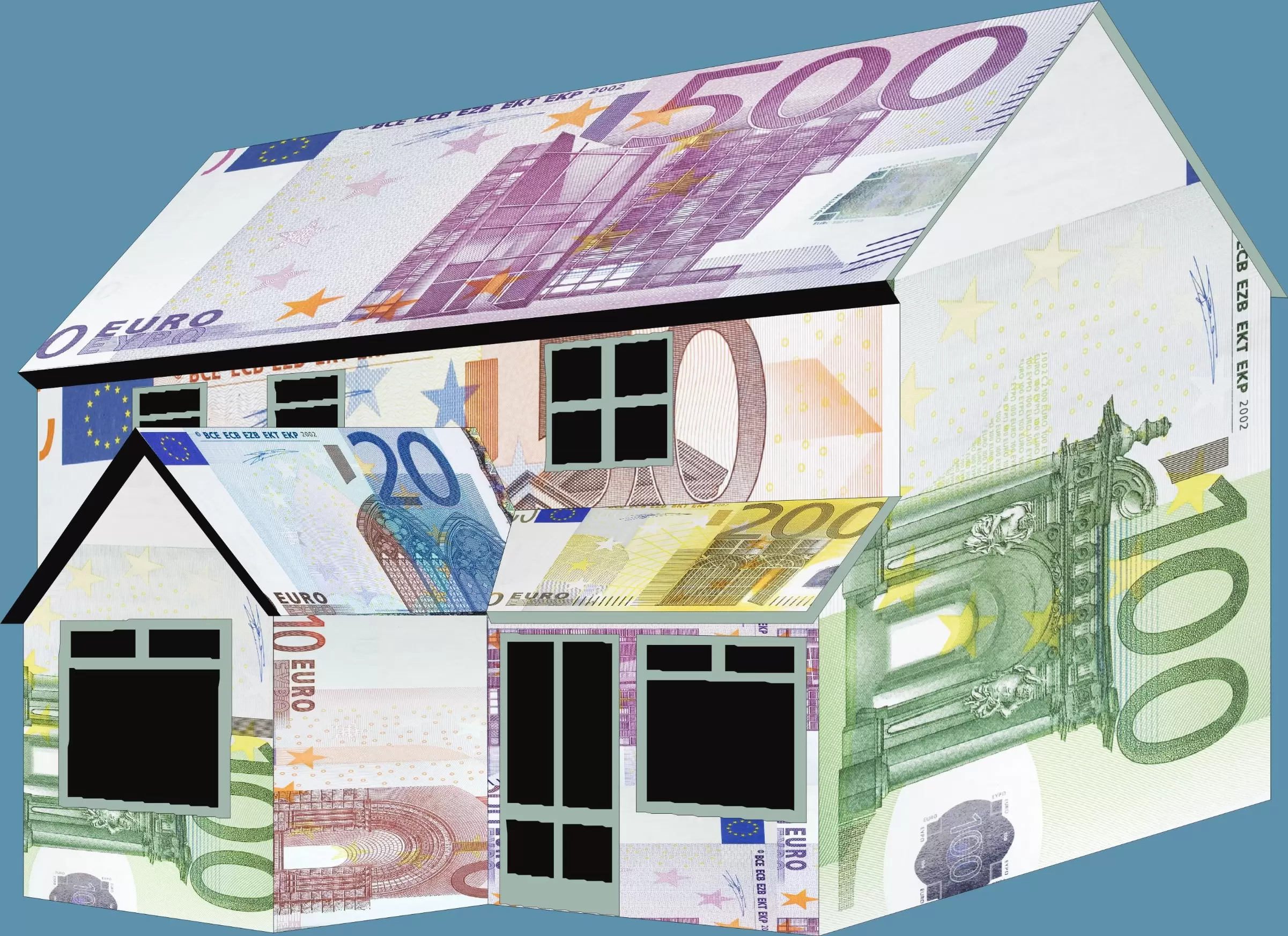
9. How To Buy Spanish Property through Financing
When buying a house in Spain, it is important to be aware of the various requirements and conditions related to mortgages and deposits. Generally speaking, mortgage providers do offer loans to non-residents of Spain up to 70%. This is a lower loan to value mortgage than currently available to Spanish residents who can expect to obtain up to 80% (subject to the profile of the applicant).
This means that buyers will need to have financing (either from savings or other lenders) sufficient to meet these criteria.
In short, non-residents can get a mortgage in Spain but there are certain legal requirements that must be met. The buyer will need to have sufficient funds to cover a deposit (typically) of at least 30% and should also be aware of their rights and duties under Spanish law when it comes to completing or cancelling a purchase.
In Spain, there is a stamp duty payable on mortgage financing. The central government has devolved this matter to the regional governments, but has set a minimum and maximum - anywhere between 0.5% to 1.5%.
Fortunately, a Spanish Supreme Court decision recently ruled that it is the banks that must pay this fee.
There will also be bank charges which generally range between 0.2% to 2%, depending on whether you are making a new purchase or refinancing an existing mortgage.
It is a good idea to reach-out to a specialist mortgage advisor in Spain, since banks can be choosy when offering mortgages to non-residents with no local personal finance history, and tend to charge more.
This is especially the case if planning to invest in a property to rent-out to tourists in Spain. It can be tricky to get a buy to let Spain mortgage, (known as an investment mortgage) and the loan to value ratio can be quite low. Professional advice is recommended, both in regard to obtaining financing, as well as the legal and tax consequences of renting a property out to tourists in Spain.
The fees, however, do not end here. You then need to consider Spanish government sales or property transfer tax.

Want to hear what other clients
are saying about us?
10. Buying Property that isn't fully Registered on the Land Registry
It is not unheard of for property purchasers in Spain to come across the situation where the property that they are interested in purchasing does not appear to be registered in the Land Registry. How can the purchasers be certain that they will acquire good title?
New Build Notice Deed: In the first place, in order that the new build property may be added to the registry, the vendor of the property must draft a document before a Public Notary, called the ‘New Build Notice Deed’ (escritura de declaración de obra nueva). To be legally protected, it is recommended that the buyer insists that the seller ensures that the actual situation is reflected in the Land Registry, ie that a property has been constructed on the land.
Where the seller is an individual, it is additionally vital to arrange deeds for the new build construction in order for the purchaser to register the title in the Land Registry.
Finalised Project Certificate: Thus, the vendor, once they have obtained the ‘Finalised Project’ certificate, ought to visit the Public Notary with the requisite municipal licences to demonstrate that this new build construction conforms to the planning permission previously granted and, therefore, to the local urban planning Acts.
They must also present a certificate issued by a registered architect that shall include the surface area and other relevant measurements of the construction. When buying property in Mallorca (and by extension, Ibiza) it is also obligatory for the vendor to provide a ‘habitability certificate’ (cédula de habitabilidad) or ‘first occupation certificate’ (primera ocupación), whichever is relevant, as well as the Energy Certificate, the latter as a result of the applicable European Union directives.
Finally, the vendor is obliged to declare in the property deeds a price or value for the new build construction, which will effectively be the same as the sales price, with the former perhaps slightly lower. Once the new build construction has been processed by the Notary, the property deeds may be inscribed at the Land Registry.
Nota Simple: In summary, the purchaser must be very sure that - before signing even a private agreement to purchase or signing an option to purchase - that the new build construction has been registered at the Land Registry. If it hasn’t, there is every possibility that the operation could fail or be delayed interminably.
By arranging a ‘basic land certificate’ or ‘nota simple’ of the property from the Land Registry we are able to verify the regulatory status of a new build construction. With regard to the Notary and Registry costs relating to the filing and registration of the new construction, typically these are met by the vendor of the property.
This is but one example of the pitfalls of buying property in Spain.
11. How much to offer for a Spanish property
Having decided that you are buying Spanish property and then having found a suitable property that you are interested in, it is usual to have some doubts about the amount that you should initially offer to the seller.
Even though in Spain we are not in the habit of thinking of an initial offer 10% lower than the initial price as a standard step –such as happens in other countries-, it is not unusual at all that the final sales price is lower than the price initially requested by the seller, especially when the property is a resale property. Discounts on new build properties are rather less frequent.
There could be plenty of circumstances that are conducive to making a 'cheeky' offer and by how much below the asking price, such as:
- the age of the property,
- its condition at the time of the sale,
- the area in which it is located,
- the demand in that area and price of similar properties, and, of course,
- the seller's need to sell (which we cannot normally know).
12. What is the Process of Buying Property in Spain
Once you have identified a property - either privately or with the help of local real estate agents - and an offer has been accepted by the seller, you begin the legal purchase process of acquiring a property in Spain. Meanwhile, below we looks at the most important aspects:
13. Valuation of the Property
The first step in a typical home purchase is to have the property valued. This is often at the insistence of the financial institution that may issue the mortgage although they will insist that you, the buyer, must pay.
The person carrying out the survey must be certified by the Ministry of Finance under the Law Regulating the Mortgage Market (Ley 41/2007).
(The surveyor or architect will most likely offer different options in terms of the type of survey they will carry-out. They can also provide assistance with any issues relating to planning permission or building permit doubts that your lawyer may have raised.)
The minimum amount chargeable for the carrying out of a valuation is €208 and will ultimately depend upon the following factors:
- Not all surveyors or survey companies charge the same
- Where the property is located
- Will the surveyor need to charge expenses (mileage etc) to reach the property
- Does the surveyor need to access technical information (plans etc)
Ultimately, the financial institution will have to accept the surveyors report and so you will most likely use one recommended by them or by an independent surveyor like TINSA that is well known and has links with most of the financial institutions. You can find a list of suitable English-speaking architects in Spain.
14. Land Registry Check
To ensure that the particulars of the property are correct i.e. the identity of the current owner(s), the mortgage charges and any other encumbrances that currently exist on the property and the existence of any court judgments affecting the property etc it is necessary to check with the land registry office, usually located at the local town hall where the property is located.
If you do this yourself the cost is a nominal administration charge of approx. €10.
Here, our lawyer Jose notes the importance of a visit to the local land registry office in Spain:
15. What is an NIE number and how do I get one?
Before being able to do, well almost anything in Spain (and certainly to purchase a property) you will need to get a Spanish NIE number - either at the Spanish Consulate in your country of residence or in Spain at a specially designated "Office for Foreigners" (Oficina de Extranjería) or via the National Police.
It typically involves arranging an appointment date at the relevant location, nowadays often over of the form that needs to be presented at a nearby bank to pay the administrative cost and then return to present your identity documents and proof of payment.
Certain regions will require proof of the purpose for obtaining the NIE, such as buying property in Spain.
An NIE may also be arranged by your legal representative upon completion of a power of attorney or similar document.
16. Banking in Spain
Spain has an active international network of residents and as a consequence, there's a growing population of people wanting to open a bank account in Spain and it is not difficult to find a Spanish bank that caters specifically for foreigners looking to open bank accounts in Spain.
A local bank account can make it much easier to set-up standing orders for the payment of utilities.
However, opening a bank account for non-residents in Spain can be a little trickier than you might think. If you're looking to open a Spanish bank account, you'll probably need to fulfill one of the following requirements: you need to be a national of Spain or you need to be an EU citizen; or, you need to have permanent residence in Spain. These are the requirements that affect the overall eligibility of an individual to open an account in Spain.
Spanish banks tend to have different rules for foreigners, with some being more strict than others. For example, some Spanish banks won't deal with UK citizens unless they can provide proof of residence or that they are a property buyer.
Be prepared to pay a fee and, indeed, ongoing fees at a higher rate than you would typically see in the UK. Spanish banks tend to be more expensive than in the UK and a premium will be attached if you are a non-resident.
17. Is it necessary to pay a deposit when buying a property in Spain?
It is typical in Spain, when making a property purchase, to expect to be asked for two deposits:
- An initial deposit of between 1,000 and 3,000 euros as a “reservation fee”
- A second deposit of 10% of the property price.
(Note the point made earlier regarding foreign buyers who qualify for a lower loan to value mortgage than residents).
The initial deposit will be required if you have found the property via a real estate agent. They will tell you that it is necessary for a "reservation" of the property i.e. to take it off the market, but in reality it is not an actual reservation. However, unless the real estate agent has an exclusive right to market the property, this is likely to be an empty promise.
Even though you have paid a deposit they will not take the property off the market, nor will they remove the online ads, and of course they will not stop negotiating with other interested parties. The real reason why estate agents require this first deposit when dealing with property purchases is to see that your offer is serious, that you are not there to waste their time.
Assuming that all of the preliminary checks determine that the property is as stated and can be purchased safely, the purchaser may need some time to put together the funds necessary to complete the purchase.
The Spanish property purchasing process provides for this by use of a "preliminary" or "deposit" contract. Effectively this is a "contract-to-contract" and normally stipulates that before a stated future date, the property will have passed from the seller to the buyer. Should either side fail to complete there are penalties.
The buyer will forfeit the deposit (up to 10% of the value of the property depending on the value) and the seller must return the deposit and pay to the purchaser a penalty equal to the amount of the deposit ie return twice that amount.
Any refundable deposits will usually depend on the terms agreed between seller and purchaser (in the arras contract), so make sure you understand what your rights are before signing anything. For more information, see: payment of a deposit when purchasing a property in Spain.
Here, Oscar, one of our lawyers in Barcelona discusses in more depth the deposit required when buying a property in Spain:
18. The Property Deeds
While it is perfectly legal to arrange for the transfer of a property in Spain via a private legal contract, this is not the typical way of doing so.
The reason is that for the new property title to be registered in the public property register it is necessary to complete the transfer of the property by public deed or ‘escritura publica’. From a practical point of view, no financial institution will offer a mortgage to facilitate the purchase without a public deed.
The process involves the drawing-up of the deeds of transfer by a public notary. This is an independent official, who oversees the process and ensures that the proceedings take place according to the law and that the documentation is verified.
The amount charged by the notary is prescribed by law and varies in function to the price of the property.
Below is a table with approximate costs according to house prices. Please note these may vary and the cost must always be confirmed by the notary before proceeding to avoid any problems:
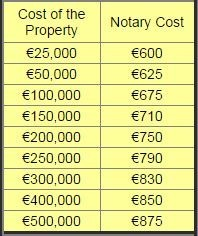
19. Final Step: Inscription of a new title on the land registry
Once the property has been transferred it is advisable to register the new ownership details with the public property register.
Apart from being a requirement to obtain a mortgage, so you might have to do this anyway, failure to register can cause multiple problems in the future with regard to future property transfers, inheritances, defending title against third parties etc. See our article on Spanish Property Laws for more information.
However, if you seek good quality legal advice, you should have no problems whatsoever - in fact, getting good legal advice is the best way to safeguard your property investment in Spain and to avoid losing money. Just make sure that the lawyer you select is registered to the local bar association or law society.
For your convenience, a Spanish solicitor list with contact details and client testimonials of English-speaking solicitors across Spain.
Below are approximate costs of the land registration fee for having this carried out. It will be necessary to check specific prices with the individual registry.
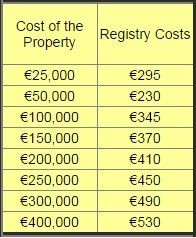
20. (Don't forget to remove the Previous Mortgage)
While not a legal requirement, it is preferable to have the previous mortgage removed from the property register. This is the case even though the mortgage has been paid off by the vendor (when selling a property in Spain this is the typical scenario). The charge will still appear on the register and it’s removal incurs a number of charges, notably notary and registry charges.
The process involves obtaining a certificate from the financial institution that issued the mortgage that the mortgage has been discharged.
This certificate is then presented to the notary who draws up a public deed to that effect. The deed is then presented to the registry for inscription on the property register which thereby removes the mortgage charge from the property.
Want to hear what other clients
are saying about us?
21. Frequently Asked Questions
When dealing with our client enquiries about buying property in Spain, similar questions tend to crop-up, and we answer them here:
Can I buy property in Spain as a non-resident?
You can certainly buy property in Spain while a non-resident. You may wish to use the property as a holiday home, and perhaps rent-out the property while not using it. You will need to obtain an NIE number, which is a fiscal number and as a non-resident, you will be liable to pay the IRNR non-residents tax. This is a tax on property ownership in Spain. If you rent-out the property, you will also need to pay tax on the income for the periods it is rented-out, and IRNR for the periods it is not rented-out. If you are a non-EU citizen you pay a higher rate of tax than EU non-residents (24% v 19%) and you cannot deduct expenses.
Is it a good idea to buy property in Spain?
Whether or not it is a good idea to buy property in Spain depends on the expectations of the buyer and the property being bought. Property prices in Spain have risen over the last couple of decades - just like in other parts of the world, though are still below the peak at the time of the great financial crisis of 2008. Spain is perhaps unique in that it has demand from around Europe and the world, so property will be more likely to maintain its value.
How much tax do you pay when buying property in Spain?
The biggest tax you pay when buying Spanish property is the ITP transfer tax, which ranges from 6.5% in the Canary Islands to 13% for properties over €2m in the Balearic Islands. New properties attract VAT at 10% in mainland Spain, and 7% in the Canary Islands. Other taxes you will need to pay include stamp duty of 0.5%-1.5% on any mortgage financing, then Council Tax in Spain (IBI) which varies according to locality. If you are non-resident, you will pay a non-resident tax which is 24% (19% if an EU citizen) of the rateable value of the property each year.
How much tax do you pay on non-resident property in Spain?
If you are a non-resident property owner in Spain you will pay 24% (19% if an EU citizen) of the rateable value of the property. The rateable value of the property is 2% of the 'catastral' value (or 1.1% if reset in the last 10 years) which is determined by the Tax Authorities. If you rent-out the property, you will have to pay income tax on any earnings. If you are a non-EU resident as well as a non-resident in Spain, you will pay 24% and not be able to deduct expenses. EU residents pay 19% and can deduct expenses.
How long can you stay in Spain if you own a property?
The ownership of property in Spain does not determine how long you may stay in Spain. If you obtain a golden visa (investor visa) upon investing a minimum of €500,000 in property, you may live and work in Spain, with no minimum stay required. If you are an EU citizen, you may live all year round in the property, though you must register as a resident after 3 months. If you are a non-EU citizen, the maximum stay is 90-days in any 180-day period.
Can a foreigner buy property in Spain?
Anyone can buy an apartment in Spain. However, the maximum amount of time you can spend in Spain will depend on the country of your citizenship. If you are an EU citizen you may live permanently in Spain, though you must demonstrate ability to support yourself financially and may need to get medical insurance in Spain if you plan to become a permanent resident. A non-EU citizen will need to obtain a visa to live permanently in Spain, such as a golden visa or a non-lucrative visa. Taxes on property also vary according to whether or not you are an EU resident or not.
Is it necessary to pay a deposit when buying a property in Spain?
It is typical in Spain to expect to be asked for two deposits, 1. An initial deposit of between 1,000 and 3,000 euros as a so-called reservation fee, and 2. a second deposit of 10% of the property price. The initial deposit will be required if you have found the property through an agency. They will tell you that it is for the 'reservation', but in reality it is not an actual reservation - even though you have paid this deposit they will not take the property off the market.
What are the costs of buying property in Spain?
Typically though, you will need to consider the cost of a lawyer and notary as a minimum, though you could also add to this a mortgage arrangement fee if buying with a mortgage. If you have found the property either via a local estate agent or one of the plethora of British real estate websites (and their Spanish counterparts) that can be viewed online, you may need to consider estate agent fees. While these are normally paid by the seller, though in theory - as well as practice - anything is possible, and sometimes buyers are expected to pay them in part or in full. It is therefore a good idea to have this detail checked before proceeding further with the purchase. Legal and notary costs will tend to equal approximately 1.5% of the value of the property. Also worth noting, when the person selling property in Spain is themselves a non-resident, the purchaser must deposit 3% of the purchase monies directly with the Spanish tax agency.
Can British Citizens buy Property in Spain after Brexit?
A number of options are available to British citizens who wish to live in Spain following the vote by the UK to leave the European Union. These range from availing of the Golden Visa programme which allows British buyers purchasing property valued at €500,000 and above to obtain a residence permit. However, foreign buyers of property are not the only ones who can obtain a residence permit. Anyone able to deposit approx. €27,000 in a Spanish bank account can also obtain a residency visa to live in Spain. This type of visa does not permit the holder to work in Spain, however.





